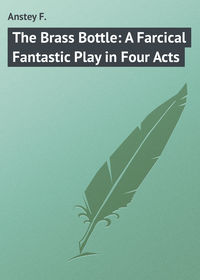 полная версия
полная версияIn Brief Authority
"I'm afraid, Ma'am," said Daphne, "I couldn't pay it back now; I sent the cheque last night."
"I am quite content to bear the loss, Miss Heritage. And, by the way, you may not be aware of it, but it is hardly correct or usual, in speaking to me, to call me 'Ma'am.'"
"I've always understood, Ma'am," said Daphne, "that our own Queen – in England, I mean – "
"How the Queen of England may allow herself to be addressed is entirely her own affair," said Queen Selina handsomely; "I have nothing whatever to do with that. But I am Queen of Märchenland, Miss Heritage, and I shall be obliged by your addressing me as 'Your Majesty' on all occasions."
"Certainly, your Majesty," said Daphne, executing a profound curtsey with a little smile that she was quite unable to repress. "I assure your Majesty that your Majesty may rely on my addressing your Majesty as 'Your Majesty' for the future, your Majesty."
"That is better, Miss Heritage, much better – a little overdone, but still – And now," she added, "you had better go and see if Princess Edna wants any assistance. You need not trouble to change your own dress, as, of course, you will not sit down to dinner with us."
"She's too priceless!" thought Daphne, when she was outside on the gallery, and could indulge her sense of humour in safety. "Still, I don't think I could stand her very long if it weren't for Ruby!"
"I say, Mater," the Crown Prince called out a few minutes afterwards outside his Mother's door, "how much longer are you and the Guv'nor going to be? All night?"
"You can come in, Clarence," she said. "How soon your Father will be ready, I can't say. I finished my dressing hours ago."
King Sidney, following her example, had declined the good offices of his gentlemen, and there were sounds from his dressing-room on the farther side of the Bedchamber which indicated that he was in some difficulties in consequence.
"My aunt!" exclaimed Clarence as he saw his Mother fully arrayed. "You've got 'em all on this time, Mater, and no mistake! So've you, Guv'nor," he added, as King Sidney joined them with rather a sheepish air. "Only – are you sure you've got yours on right? I mean to say – that ruff looks a bit cock-eyed."
"It's given me more trouble than any white tie, my boy – but it must do as it is."
"Ah, I got that bristly-haired chap – what's his name – Hansmeinigel – to put on mine for me. Didn't any of yours give you a hand?"
"They offered to – most kindly," said King Sidney, "but – well, I didn't altogether relish letting them dress me."
"They'd have made a jolly sight neater job of it than you have – keep still a jiff till I've tucked this tape in. There – that's more like it. And I say, you and the Mater had better hurry – you're keeping the whole Court waiting for you!"
"Why didn't you tell us before?" said the Queen in a violent flurry. "Where – where are the Court?"
"All drawn up in the Hall at the foot of the big staircase. They can't make a move till you come down, and lead the way in to dinner, you know!"
"I – I'd rather not descend all those steps in public," objected the King. "Confoundedly slippery. Er – couldn't we go by the backstairs, my love?"
"And find ourselves in our own kitchen!" said the Queen. "Certainly not, Sidney! The grand staircase is the only dignified way down, and you had better give me your arm at once."
"Very well, my dear, very well. But I'm pretty sure I shall slip."
"You must not slip, Sidney! Neither of us must slip. If we did, it would produce a very bad impression. Still, it will be safer if we go down one by one, and hold on to the banisters."
"No, I say," cried the Crown Prince, "you can't do that – might as well crawl down on all fours! Buck up, both of you. Try and throw a little swank into it!"
Their Majesties accomplished the descent amidst the congratulatory blare of the silver trumpets without actual mishap. But there was nothing in the bearing of either Sovereign that could justly be described by the term "swank," and indeed, if any fault could be found, it would have been in quite the opposite direction.
Of the banquet itself little need be said here. The numerous courses were appetising and admirably served, while, to the Queen's relief, none of the dishes showed any desire to take part in the conversation.
The members of the Court did more than look on this time, being entertained, with other guests, amongst whom were the President and Council, at cross tables below the principal one on the dais.
Clarence, seated with his family, the Ex-Regent, and the Court Godmother at the high table, wished more than once that he could have sat by Daphne, whom he could see at no great distance. He noted her perfect ease, and the pretty graciousness with which she received the attentions which her neighbours seemed only too anxious to press upon her.
"Anyone would think she'd lived with swells all her life," he thought. "She may have, for anything I know!" But, of course, even if she had, the fact did not make her his equal now.
Towards the close of the feast King Sidney, who had long since disposed of his crown underneath his chair, considered that the occasion demanded a speech. His effort might have been a greater success if he had abstained from jocularity, which was not by any means his forte. It is possible that a far happier sample of British humour would have failed to set Märchenland tables in a roar, but his hearers were either unaware that he intended to be humorous, or sensible that his purpose had not been achieved, for they listened in puzzled but depressed silence, while the effect of his facetiousness on Daphne was to render her hot and cold by turns.
The banquet over, the Court Chamberlain deferentially informed the Royal Party that they were expected to lead the procession to the Ball Room.
Clarence, who had unfortunately come away from "Inglegarth" without his cigarette-case, was longing to smoke, and hung behind for that purpose. But on applying to the Marshal, he was told that only common soldiers ever smoked in Märchenland. With some trouble a highly flavoured pipe, a tinder-box, and a pouch containing a dried herb that appeared to be the local substitute for tobacco were procured for him. However, a very short experience convinced him that duty required him to put in an appearance at the State Ball.
The Ball Room was a long, lofty hall, lit by thousands of candles set in great golden hoops; the light they gave being multiplied almost to infinity by the fact that the walls and ceiling were lined with elaborately engraved looking-glass, which, fortunately perhaps for the Queen, was dumb. When he entered, the musicians were already fiddling, piping, and fluting in a gallery high up at one end facing a raised platform, where his father and mother, looking extremely hot and uncomfortable, were seated on gorgeous chairs. A stately measure was being performed, which might have been a gavotte or minuet or pavane for anything he could say; all he knew was that the figures were quite unfamiliar to him.
But Daphne seemed to have learnt them – or had they come to her by instinct? – for she was dancing in one of the sets. He watched her lissome form as she moved through the intricate evolutions till he began to envy the Count von Daumerlingstamm, her elegant but undersized partner. However, he flattered himself that he would have no difficulty in cutting out little Daumerlingstamm.
It seemed to him that that dance would never be over, but the moment it was, he made his way to Daphne with an air that showed he was fully aware of the distinction he was conferring. "Enjoying yourself, Miss Heritage?" he said. "Don't know what that last dance was – but not much 'vim' about it, if you ask me. Tell you what – I'll get those fiddler fellows up there to play something a bit livelier, and you and I'll show this crowd a two-step, what?"
"This is a great honour, your Royal Highness," said Daphne, after sinking demurely in the regulation curtsey. "But I must not accept it until I have her Majesty's permission." ("Which I'm quite sure she won't give!" she thought to herself with much satisfaction.)
"Oh, I say – what rot! The Mater won't mind! And if she does – !"
"It would be very disagreeable for me, your Royal Highness!"
"Oh, well," he said, "I'll go and ask her."
As Daphne had anticipated, Queen Selina's refusal was most emphatic. "You ought to know, Clarence, that it's utterly out of the question!" she said. "And I'm surprised at Miss Heritage having the presumption to expect it."
"She didn't, Mater. She said I'd better ask you first."
"Then it seems she has a better sense of her position than you have of yours, Clarence. I'm told you have been seen walking about with a disgusting pipe in your mouth, and that several people were remarking on it. Now you are actually proposing to make yourself conspicuous by dancing at a State Ball with your sister's companion! I have always credited you with being a man of the world – but if this is the way you are going on – !"
He felt the sting of so unwonted a rebuke. "I daresay you're right, Mater," he acknowledged. "I'll be more careful after this."
"I hope you will, I'm sure. As Crown Prince you mustn't think of any partner under the rank of Baroness. Ask one of the Princesses first, or you'll give more offence."
"Right-oh!" was all he said, and, feeling that it would be awkward to make any explanation or excuses to Daphne, he solved the difficulty by avoiding her for the rest of the evening.
Princess Goldernenfingerleinigen, a prepossessing but not very forthcoming damsel, enjoyed the distinction of being commanded by the Crown Prince as his first partner.
He had had no experience in conversing with Princesses, and she did not exert herself either to put him more at his ease or prevent him from losing himself frequently in the mazes of the dance. Once or twice he was oppressed by a painful suspicion that he had seen her making a little grimace of self-pity at the Countess Gänsehirtin. But elaborately engraved mirrors are not very trustworthy, and he might have been mistaken. Still, he was thankful when the dance, in which he was conscious of having done himself so little credit, came to an end.
"Edna, old girl," he remarked subsequently to the Princess Royal, "I call this a rotten ball. Can't stick dancing with any more of these Princesses!"
Princess Edna, it appeared, had been no more favourably impressed by the Courtiers.
"They've simply no conversation," she complained, "and no ideas about any serious subjects!"
"No, I've noticed that," he said; "and they think they're the only people who can dance! I tell you what – you and I'll show 'em how we do the Tango. That'll make 'em open their eyes!"
It did. As has already been said, both he and Edna, as persons who could not afford to be out of the movement, had taken lessons that winter in the recent importation from dubious Argentine dancing-saloons. They danced it now with conscientious care, Prince Clarence exhibiting as much abandon as a man could who was dancing with his sister.
But the Court were not sufficiently enlightened to appreciate the performance. They evidently considered it not only uncouth and undignified, but more than a little improper, and their general attitude conveyed that the couple were committing one of those temporary indiscretions which it was not only etiquette but charity to pass over in silence.
"Capital!" said King Sidney, clapping his hands at the conclusion. "Uncommonly well they dance together, eh, my dear – never seen them do it before."
"And you will never see them do it again, Sidney," replied the Queen; "for I'm much mistaken if they haven't broken up the Ball!"
She was not very far wrong, for although, after some minutes of awestruck silence, dancing was resumed, it was carried on with a restraint and gloom that soon decided the Royal Family to retire from the Ball Room.
The Queen forbore from expressing her sentiments just then either to her son or daughter, with the latter of whom, indeed, she seldom, if ever, ventured to find fault. But she felt that her first evening in the Palace had not been a brilliant success.
This feeling impelled her to be more ingratiating than ever to her ladies of the Bedchamber, whose services in disrobing her she was compelled to accept, though under protest.
"So much obliged!" she said, as they finally withdrew with glacial ceremony. "Quite ashamed to have troubled you, really! Good-night, dear Princess, good-night. We shall breakfast at 8.30. But en famille, you know – quite en famille– so don't dream of coming down!"
"I hope, Sidney," she began later, as he joined her in the Royal Bedchamber, "I hope you have treated the gentlemen who undressed you with proper consideration. It is so important… Good gracious! What's that you've got on? A night-cap?"
"Those – er – noblemen seemed to consider it the correct thing, my love, and they've put me on this night-gown, too."
"I see they have. Embroidered all over with impossible animals. You look a perfect sight in it!"
"I'm told they're – er – hippogriffs, my dear, the – ah – Royal Crest or emblem or something. I should have much preferred pyjamas myself. But it seems they are not procurable here."
"Everything in this country is in a disgracefully backward state!" declared the Queen; "and I can see I shall have hard work to bring it up to my ideas of what is proper. I shall begin by putting that old Mrs. Fogleplug in her proper place."
"I should be careful, my dear," advised King Sidney. "After all, you know, she's by way of being a Fairy."
"So she says! But, Fairy or no Fairy, she's much too familiar. And if she cannot conform to my rules, she will have to go, that's all."
"Well, my dear, I daresay when you put it to her like that," began the King, who had by this time succeeded in clambering into the immense bed, and whose head was already buried in an enormous pillow. "As I was saying," he continued hazily, "put it to her in – in that way, and – and – no doubt … very probably … no reason to suppose … any…" But here his voice sank into an unintelligible murmur, until it rose presently into his first, but not by any means last, snore in the character of monarch.
CHAPTER VI
CARES OF STATE
Queen Selina was as good as her word. The first thing after breakfast the next morning she retired to her Bower, and sent a summons to the Court Godmother, desiring her immediate attendance. King Sidney was engaged in interviewing the Lord Treasurer on the subject of the Royal revenue. The Crown Prince and Princess Edna were strolling on the terrace, and Daphne had discovered the board and pieces of a game something between Chess and Halma, the rules of which she and Princess Ruby were learning under the instruction of the Countess von Haulemännerschen. So that the Queen, having taken care not to disturb any of her ladies-in-waiting, could count upon being able to deal faithfully with the obnoxious old Fairy without fear of interruption.
"Well, my dear," began the latter, as soon as she appeared, "I hope you passed a comfortable night?"
"I don't know when I passed a more uncomfortable one, Mrs. Fogleplug. That is one of the things I wished to speak to you about. After being accustomed as I have to a spring mattress, all those great feather beds made it simply impossible to get a wink of sleep!"
"That," said the Fairy, "is one of the penalties of being of the blood Royal. An ancestress of yours slept in that very bed, my dear, ages ago, before even I can remember – or I should rather say she tried to sleep, but could not, owing to a pea that had somehow got under the lowest feather-bed of all. It was certainly very careless if the pea has never been removed."
"It would also show, Mrs. Fogleplug, that during all those ages the bed can never have been properly aired. I should have thought it would have been your business to see to that."
"Then you would be entirely mistaken, my dear, for it is not. And, as I notice that you find a difficulty in pronouncing my name correctly, I may suggest that it would be simpler in future to call me by my proper title, which is, 'High Court Godmother,' or 'Court Godmother,' if you prefer it."
"And while we are on the subject of titles," said Queen Selina, "I may mention that it is customary to address a Queen as 'Your Majesty,' and not as 'my dear.'"
"It has always been my habit with Sovereigns, and I have never heard it objected to till now."
"Well, I object to it. But – and this is what I sent for you about – there are other matters I object to even more. I intend to regulate my household on a thoroughly modern and English system, and I cannot have any member of it careering about in the air in outlandish cars drawn by birds. If you must have a conveyance you must be content with a brougham or a victoria, for I shall insist on your putting down both those bird-cars."
"You seem to forget that, but for one of them, you would never have come into your Kingdom!"
"That may or may not be. At any rate there is no further necessity for them, and – well, it just comes to this, Madam, either they go or you do."
The old Fairy's eyes smouldered with anger, and her nut-cracker mouth and chin champed for a few seconds before she replied.
"I have occupied rooms in this Palace – when not at the Palace of Clairdelune – for over a century and a half, and I have no intention of giving them up. I shall also continue to use the vehicles which I find most convenient."
"Oh?" said the Queen, "will you? We shall see about that!"
"We shall," the Court Godmother retorted. "I don't think you quite realise yet whom you have to deal with. I may be getting on in years, but both here and at Clairdelune I am accustomed to being treated with more deference and respect than you seem disposed to pay me. You see, they know that, although I have not used the full powers I possess as a Fairy for many years past, I have not lost them altogether. I might see fit to employ them once more – on any person who was rash enough to incur my displeasure. And ingratitude and pride are the failings which I always made it my particular business to correct. You would find it more to your advantage to be on good terms with me." There was no mistaking the veiled threat, and Queen Selina no longer doubted the Fairy's abilities to carry it out. She was worsted, and her only course was to give in gracefully.
"My dear Court Godmother!" she cried, "you quite misunderstood me! I'd no wish to interfere with any of your habits – not in the very slightest degree. All I meant was that, perhaps, at your age, a more ordinary carriage than your present ones might be – er —safer, you know!"
"I am quite capable of looking after my own safety, thank you. But, though you are our beloved Prince's daughter, you have been brought up in ignorance of the ways of this country, so I am the more willing to overlook treatment to which I feel sure I shall not have to draw your attention again. And now, as we quite understand one another, my dear, we will say no more about it. By the way, I hear you haven't sent for any of your ladies-in-waiting this morning. How is that?"
"I – I didn't quite like to, Court Godmother. We're – well, hardly intimate as yet. They are so reserved and distant – especially that Princess Rapunzelhauser. But, of course, she comes of a very high family."
"She is descended from the famous Rapunzel, whose story is no doubt familiar to you… No? Well, her father was a poor cottager who was caught by an old witch stealing radishes from her garden. She let him off on condition that he gave up to her the child his wife was expecting. Rapunzel was the child, and in due time was claimed by the witch, who shut her up in a lofty tower. However, she had the most wonderful hair, so long that when she let it down from the top window it touched the ground, and so thick that the Prince whom she subsequently married was able to climb up by it, and make love to her."
"Now you mention it, I have some faint recollection – and so Princess Rapunzelhauser is descended from her! Well, that would account for – but Princess Goldenenfinger – something, now, she does look as if she had some good blood in her veins."
"The best in Märchenland. An ancestor of hers was King of one of the smaller Kingdoms into which the country was divided in those days. One day when out hunting he found a woodcutter's daughter living all alone in a hollow tree, and fell violently in love with her."
"A woodcutter's daughter? Dear me! Then, of course, marriage was out of the question."
"Not at all! they were married and had children. Unfortunately there was an estrangement between the King and Queen later as she was accused of having murdered them, and condemned to be burnt to death."
"It only shows what a mistake it is to marry beneath one."
"This marriage ended happily. It was discovered, just in time, that the children were alive after all."
"Still," said the Queen, "it is not a pleasant thing to have happened in any family. I should like to hear something about the pedigrees of my other ladies-in-waiting."
The Court Godmother was quite ready to give her all the information she could. Princess Flachspinnenlosburg, it appeared, traced her descent from the incorrigibly lazy daughter of a poor and not over scrupulous mother; Baroness Belohnte von Haulemännerschen from similarly humble folk, whose daughter was servant of all work to seven dwarfs, and afterwards married the King of one of the petty states before mentioned; Baroness von Bauerngrosstochterheimer's ancestor was a peasant; Countess Gänsehirten am Brunnen's ancestress a goose-girl – and so on through the entire list. Queen Selina then became curious as to the origin of the gentlemen of her Court, and found that many of their forbears were sullied by the taint of Trade. The founders of both Prince Tapfer von Schneiderleinberg's and Count Daumerlingenstamm's houses were tailors; Baron von Bohnenranken derived his title from a speculator who, after a remarkably unsuccessful venture in cattle, had made a colossal coup in beans. As for Prince Hansmeinigel, his pretensions to high descent were even more questionable – at least, if it was actually the fact, as the Fairy stated, that the first of his progenitors was not only the son of a poor father, but also suffered the additional social disadvantage of being a hedgehog from the waist upwards; added to which he seemed to have cherished an eccentric passion for playing the bagpipes while riding on a cock. It is true that, after his marriage with a Princess, he became a less impossible member of Society – still, as the Queen very rightly felt, there are some things which can never be altogether lived down.
"I'm much obliged to you for telling me all this, Court Godmother," she said, at the end; "most interesting, I'm sure. And so useful to know who everybody really is!"
It was something of a disillusion to find that her Court was so largely composed of parvenus, but, on the other hand, it enabled her to face her ladies-in-waiting in future without any distressing sense of inferiority.
She was on the point of summoning them when the King suddenly burst into her bower. "Selina, my love," he began, with suppressed excitement, "if you'll tell this good woman to go, I've something to say to you."
"Oblige me, Sidney," replied the Queen, "by not alluding to the High Court Godmother again as a good woman; we may consider ourselves very fortunate that she is doing us the honour of residing under our roof, and you will be good enough to show her proper respect."
"Oh, sorry, I'm sure; I thought you said – but if that's how it is, I apologise for interrupting you."
"I have said all I have to say," said the Court Godmother, "so there is no need for me to remain any longer." And with that she hobbled out of the room.
"I suppose you got your way about those – ah – bird-chariots, my dear?" he asked, "as you don't seem to have sacked her!"









